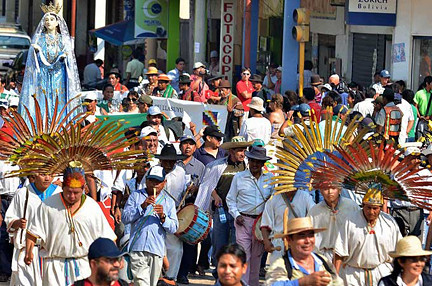
As Brazil finances development in neighboring countries, Bolivia's "defender of Pachamama" is challenged by local Indians.
By CARLOS VALDEZ
Associated Press
Go to original article.
LA PAZ, Bolivia — Bolivian President Evo Morales has become a fixture at global climate talks, arguing passionately for preserving the world's forests and demanding strict cuts in rich countries' greenhouse gas emissions.
"The planet is mortally wounded. We feel its convulsions. If we don't do something we'll be responsible for genocide," he intoned in Cancun, Mexico, in December. Morales regularly blames capitalism for environmental destruction.
But at home, this fervent oratorical defender of Pachamama, 'Mother Earth' in his native Aymara, is seen by many as downright eco-unfriendly.
Environmentalists and indigenous groups accuse him of hypocrisy for promoting natural gas and oil exploration in virgin forests of this landlocked South American nation that ranks eighth globally in tropical forests. Critics say he's also turned a deaf ear to complaints about contamination of drinking water and crops from mining. Many are also angry over his support for a law designed to expand the use of genetically modified crops.
"Morales isn't a defender of Mother Earth. His rhetoric is empty," said Rafael Quispe, leader of the main indigenous organization in Bolivia's highlands, Conamaq.
The president insists the projects are needed to lift Bolivians from poverty and provide energy and food security.
One of the unfortunate consequences of the dispute is that Morales is losing some of his support from Indian groups who initially heartily backed him as the first indigenous president of a nation where more than three in five people are natives.
The groups' most ardent objection is to a proposed highway connecting Brazil with Pacific ports in Chile and Peru, which they say will mostly benefit Brazilian commercial interests such as logging exporters. It is being built with a $415 million loan from Brazil's national development bank, and a Brazilian company, OAS, has the green light to begin toppling trees. The road will plow through a 4,600-square-mile (12,000-square-kilometer) nature preserve.
Conamaq and another powerful indigenous federation have organized marches for Monday to demand the road be scrapped.
Edwin Alvarado, spokesman for Bolivia's Environmental Defense League, or LIDEMA, calls the highway a pretext for eventual oil exploration in the rain forest.
The 190-mile (300-kilometer) highway would link Bolivia's western highlands with the Amazon through the pristine Isiboro-Secure Indigenous Territory National Park, where 15,000 natives live off hunting, fishing, gathering native fruits, and subsistence farming. It is home to endangered fresh-water dolphins and blue macaws.
The road would erase more than 2,300 square miles (6,000 square kilometers) of rain forest over two decades, environmentalists estimate.
To prevent the road from being built, the Yuracare, Chiman and Trinitaria peoples who live in the park are prepared to use "bows and arrows" against any interlopers, says Pedro Moye, a leader of the CIDOB association of indigenous peoples of eastern Bolivia, which says it represents 800,000 of Bolivia's 10 million people.
Under the 2009 constitution championed by Morales, the country's indigenous groups must be consulted in advance about any projects that might affect their traditional lands. The law does not give them veto power.
In this case, the government says it discussed the road with local indigenous officials, though Moye says the proper authorities, tribal assemblies, were not consulted.
Morales has been unyielding.
"Whether you like it or not, we are going to build this road," he bellowed in June at a gathering of the project's backers outside Cochabamba. The highway will reduce the time it takes to drive from Cochabama, in the Andes eastern foothills, to Trinidad, capital of Beni state, in the northeast.
The government says the highway will help develop Beni, which borders Brazil and is nearly the size of Great Britain but has just 155 miles (250 kilometers) of paved roads.
Morales claims local Indians are being manipulated by irresponsible environmentalists to the detriment of peasants who would benefit economically. Environmentalists accuse Morales of ulterior motives beyond energy exploration and commerce.
First, they say, the road is attractive to coca-growers in the Chapare region abutting Cochabamba. Bolivia's main coca-growers' union, which Morales still leads, backs it.
Environmentalists and indigenous leaders are also upset by Morales' support for a Brazilian proposal to tame wild rivers throughout the Amazon with big hydroelectric projects, including three in Bolivia.
And they complain about oil exploration by Venezuela's state-owned oil company PDVSA in the Madidi reserve north of La Paz and by Bolivia's state-owned YPFB exploration in the southeastern Chaco region, home to the Guarani, Bolivia's third-largest ethnic group.
Gas has been a key export for Bolivia, with Argentina and Brazil the main beneficiaries. In a June speech, Morales railed against those who resist oil and gas exploration, calling them "fundamentalists."
"I can't understand those who oppose it. There is an energy crisis in the world," he said.
No comments:
Post a Comment